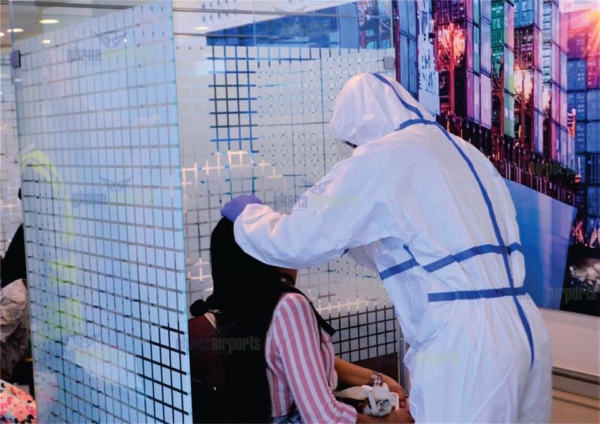Are you in government today? Have you ever been in government? In the privacy of your heart and mind, if your personal success story is that you have become wealthy and you know that the source of that wealth is bribery and corruption, you must know that your hands are stained with blood money – the blood of Ghanaians.
Disbursement of Covid-19 funds and the fight against Galamsey, Bus Rebranding and the procurement of the two Airbus C-295 aircraft between 2009 and 2015 have exposed the base nature of Ghanaians: we are perhaps at our worst in depravity.
Talking about Covid-19 funds, I will use this opportunity to repeat the question I posed in January: who selected Frontiers Health Services to provide the Covid-19 testing at Kotoka Airport at the height of the pandemic in 2021? Who negotiated and agreed on $10 for Ghana and $140 for Frontiers?
We may never have the answers. The ultimate question is, what is your definition of success? It is precisely to convince all of us that we don’t need to be corrupt to be wealthy or successful, that we can do clean business, engage in visionary projects to lift the mass of humanity out of poverty, and I want to share the story of Grameen Bank with us.
Grameen Bank, of Bangladesh, is the bank that lends to the poor, including lending to beggars! The bank’s loans are given to entrepreneurs too poor to qualify for traditional bank loans. It was founded by Professor Mohammed Yunus, an economist.
In 1976, during visits to the poorest households in parts of the country, Yunus discovered that very small loans could make a disproportionate difference to the village women who made bamboo furniture and had had to take usurious loans to buy bamboo.
Traditional banks did not want to make tiny loans at reasonable interest to the poor due to the high risk of default. But Yunus believed that given the chance, the poor will repay the money. Yunus lent $27 of his money to 42 destitute basket weavers in the village and taught them a few sound financial principles so they could help themselves. The women made a profit of $0.02 each on the loan.
The repayment percentage was very high.
In December 1976, Yunus finally secured a loan from the government Janata Bank to lend to the poor. The institution continued to operate, securing loans from other banks for its projects. By 1982, it had 28,000 members. On October 1, 1983, the pilot project began operation as a full-fledged bank for poor Bangladeshis and was renamed Grameen Bank ("Village Bank").
To ensure repayment, the bank uses a system of "solidarity groups". These small informal groups apply together for loans and its members act as co-guarantors of repayment and support one another's efforts at economic self-advancement.
By July 2007, Grameen had issued $6.38 billion to $7.4 million borrowers. Yunus is a university Professor; yes, but the concept’s success had nothing to do with scholarship. Nor was Yunus motivated by expectations of fame and wealth. On the contrary, success and fame have chased him.
Professor Yunus is the recipient of numerous international awards for his ideas and endeavours, including the Humanitarian Award (1993) by CARE, USA; World Food Prize (1994), World Food Prize Foundation, USA; lndependence Day Award (1987), Bangladesh’s highest award; King Hussein Humanitarian Leadership Award (2000), Jordan; Volvo Environment Prize (2003), Nikkei Asia Prize for Regional Growth (2004), Franklin D. Roosevelt Freedom Award (2006), Roosevelt Institute of The Netherlands, and the Seoul Peace Prize (2006). He once served on the board of the United Nations Foundation.
Yunus has been awarded 50 honorary doctorate degrees from universities across 20 countries, including Argentina, Australia, Bangladesh, Belgium, Canada, Costa Rica, India, Italy, Japan, Korea, Lebanon, Malaysia, Peru, Russia, South Africa, Spain, Thailand, Turkey, the UK, and the US. He is a recipient of 113 international awards from 26 countries, including state honours from 10 countries.
Now, that is what I call success; fulfilment.
Are you a fulfilled Ghanaian? Through this article, I want to convince all of us that success is not going into politics, through lies, to acquire positions that place the wealth of this country at your disposal to feed your greed. Someone is certain that the Grameen Bank concept will not work in Ghana. His reason is that we are too hungry and too dishonest to be trusted to pay back the small loans. The average Ghanaian will start-upper will retort: “Who needs SMALL loans!” We are “thinking BIG” – where “big” means mansions and fleet o
Latest Stories
-
All set for Women in Sustainability Africa Summit & Launch on 1st May
4 hours -
Appiah Adomako writes: Why Ghana must reset its public holidays for productivity and economic growth
4 hours -
Cedi gains marginally against dollar as demand pressures wane; one dollar equals GH¢15.96
4 hours -
Bond market: Trading activities surged 106% to GH¢1.14bn
5 hours -
Conclave to elect new pope to begin on 7 May, Vatican says
5 hours -
Child damages €50m Rothko painting in Dutch museum
5 hours -
“Who born dog!” Angry Kennedy Agyapong clashes with “ohiani” Abronye
6 hours -
GBA resolution on CJ suspension must show legal reasoning or be treated as political – Deputy AG
6 hours -
CDS hosts two Two-Star Generals in valedictory speech
6 hours -
Foreign Affairs Ministry rolls out chip-embedded biometric passport
7 hours -
Citizens, not just leaders, must drive national transformation – Ofosu-Dorte
7 hours -
Ghana more dependent today than previously – Ofosu-Dorte
7 hours -
Galamsey: State of emergency needed or we risk point of no return – Dr. Ashigbey
7 hours -
Transformation mindset needed to better-develop Ghana – Ofosu-Dorte
8 hours -
Bliss GVS Pharma donates anti-malaria drugs to Regional Medical Stores, Takoradi, and Tamale Teaching Hospital
8 hours

